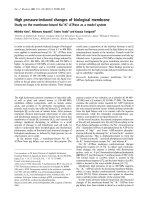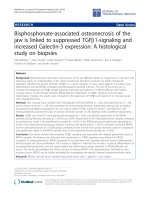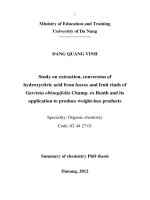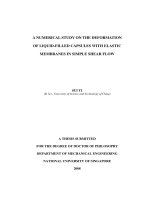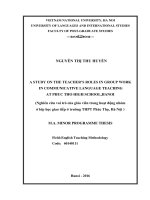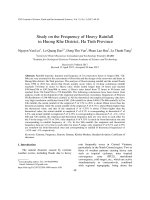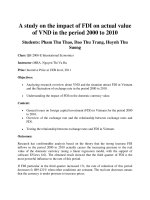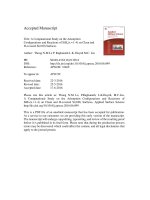Histological study on the changes of elastic fibers in localized scleroderma model in thin skin of adult male albino rat and the possible curative role of bone marrow-derived mesenchymal
Bạn đang xem bản rút gọn của tài liệu. Xem và tải ngay bản đầy đủ của tài liệu tại đây (356.21 KB, 5 trang )
Int.J.Curr.Microbiol.App.Sci (2019) 8(5): 1791-1795
International Journal of Current Microbiology and Applied Sciences
ISSN: 2319-7706 Volume 8 Number 05 (2019)
Journal homepage:
Original Research Article
/>
Histological Study on the Changes of Elastic Fibers in Localized
Scleroderma Model in Thin Skin of Adult Male Albino Rat and the Possible
Curative Role of Bone Marrow-Derived Mesenchymal Stem Cells
Maram M. Elkelany*, Amira A. Kassab, Amal A. Abd-Elhafez,
Amany M. Mousa and Thoraya A. El-deeb
Histology Department, Faculty of Medicine, Tanta University, Egypt
*Corresponding author
ABSTRACT
Keywords
Elastic fibers,
Scleroderma model,
Albino rat,
Mesenchymal stem
cells
Article Info
Accepted:
15 April 2019
Available Online:
10 May 2019
Scleroderma is an autoimmune disease manifested by painful digital ulcers, joint
contracture and skin thickening. Bone marrow-derived mesenchymal stem cells (BMMSCs) have become a recent focus of interest in tissue regeneration. The aim of this work
was to study the changes of elastic fibers in localized scleroderma model in thin skin of
adult male albino rat and the possible curative role of bone marrow-derived mesenchymal
stem cells. 45 rats divided into control group included 15 rats, scleroderma-model group
were injected with bleomycin subcutaneously in the mid back for 4 consecutive weeks,
media treated group received media one day after the last bleomycin injection, stem cell
treated group received suspended BM-MSCs (2.5×106) one day after the last bleomycin
injection. Scleroderma-model and media treated groups showed black thick elastic fibers
in both papillary and reticular dermis using Verhoeff’s method. However, stem cell group
showed black thin elastic fibers in both papillary and reticular dermis. From this study, it
could be concluded that bleomycin induced structural changes in the dermis of thin skin
that was ameliorated by BM-MSCs. So, it is recommended to use mesenchymal stem cells
(MSCs) in scleroderma treatment.
Introduction
Scleroderma is an autoimmune disease
manifested by painful digital ulcers, joint
contracture, beak-shaped nose, reduced
aperture of the mouth (microstomy), radial
furrowing around the mouth and skin
thickening. Moreover, the patient’s face
becomes expressionless, mask-like and
appears ‘mummified’ (Krieg and Takehara,
2009). The term "stem cell" can be applied to
group of cells that share two characteristic
properties.
Firstly, they have the capacity for prolonged
or unlimited self-renewal, and secondly they
retain the potential to differentiate into a
variety of more specialized cell types. Bone
marrow stroma contains precursor cells that
are capable of differentiating to hematopoietic
cell and mesenchymal cell (Ryan et al.,
2005). Bone marrow-derived mesenchymal
stem cells (BM-MSCs) have become a recent
focus of interest in tissue regeneration due to
their easy isolation and culture (Chen et al.,
2012).
1791
Int.J.Curr.Microbiol.App.Sci (2019) 8(5): 1791-1795
BM-MSCs have been found to play an
important role in improving tissue fibrosis
caused by various diseases such as stroke and
myocardial infarction. Therefore, BM-MSCs
may be considered as an attractive tool in the
therapy of skin lesions (Wu et al., 2014).
Subsequently, the aim of this work was to
study the changes of elastic fibers in localized
scleroderma model in thin skin of adult male
albino rat and the possible curative role of
bone marrow-derived mesenchymal stem
cells.
carefully dissected and
histological examination.
processed
for
Mesenchymal stem cells achievement
Principle
The bone marrow of the femurs, tibias and
humeri of rats were extracted, collected and
cultured for mesenchymal stem cells (MSCs)
achievement.
When
MSCs
reached
confluence (70 - 80%) in subcultures,
trypsinization was done. The cells were
counted and injected at a dose of 2.5×106/rat.
For light microscopy (Verhoeff’s method)
(Bancroft et al., 2013)
Materials and Methods
Study design
This study was performed on 45 adult male
albino rats. They were divided into 4 groups:
Control group: It included 15 rats for
histological and ultrastructural study of the
thin skin.
Bleomycin-treated(scleroderma-model)
group: It included 10 rats that were
subcutaneously injected with 0.1 mg of
bleomycin dissolved in 0.1 ml saline daily in
the mid back for 4 consecutive weeks. Skin
specimens were obtained from their mid back
after 4 weeks from the last day of bleomycin
injection (Juniantito et al., 2013).
Media-treated group: It included 10 rats that
received subcutaneously 1ml of freshly
prepared media after dealing as the bleomycin
group.
BM-MSCs-treated group: It included 10 rats
that received BM-MSCs (2.5×106) suspended
in its specific media by subcutaneous
injection in the mid back after dealing as the
bleomycin group (Maria et al., 2016).
At the appropriate time, the animals were
anesthetized by intraperitonial injection of
sodium pentobarbital (50 mg/Kg) (Gaertner et
al., 2008) and the injected mid back skin was
The specimens were immersed in 10%
natural-buffered formalin for 24 hours,
washed, dehydrated, cleared and paraffin
immersed. Then, sections were stained using
Verhoeff’s method.
Results and Discussion
Light microscopic results (Verhoeff’s van
Gieson)
Examination of skin sections obtained from
the control animals showed black colored thin
elastic fibers in the reticular dermis. Elastic
fibers appeared also to surround the hair
follicles and sebaceous glands (Fig. 1A).
However, sections of bleomycin-treated
animals showed black thick elastic fibers in
both papillary and reticular dermis. Moreover,
thick elastic fibers were observed around the
hair follicles (Fig. 1B). The same was found
in specimens of bleomycin and media-treated
animals (Fig. 1C). In contrast, examination of
skin specimens of bleomycin and bone
marrow
derived-MSCs-treated
animals
showed black thin elastic fibers in the dermis
(Fig. 1D).
1792
Int.J.Curr.Microbiol.App.Sci (2019) 8(5): 1791-1795
Fig.1 A photomicrograph of a section in the skin from the control group showing black, thin
elastic fibers in the reticular dermis (arrows). Notice the elastic fibers surrounding the hair
follicles (f) and sebaceous glands(s) (1A). A photomicrograph of a section in the skin from
bleomycin-treated animal showing black thick elastic fibers in the dermis (arrows). Notice thick
elastic fibers surrounding the hair follicle (f) (1B). A photomicrograph of a section in the skin
from bleomycin and media-treated animal showing black thick elastic fibers in the dermis
(arrows) (1C). A photomicrograph of a section in the skin from bleomycin and MSCs-treated
animal showing black thin elastic fibers in the dermis (arrows) (1D) (Verhoeff’s van Gieson,
6A,6B,6C,6D X 400)Control group, Bleomycin, Media, MSCs groups
Verhoeff’s Van Gieson stain of specimens of
animals treated with bleomycin alone as well
as bleomycin and media-treated animals of
this study showed black and thick elastic
fibers in both papillary and reticular dermis.
This was consistent with Chatterjee et al.,
(2004) who observed a significant increase in
the elastic fibers content in the dermis of
scleroderma patients. This was confirmed by
Ould-Ali et al., (2012) who observed
increased density of elastic fibers during
study of dermal sclerosis induced by
bleomycin. This finding may be attributed to
increased production of elastic fibers by the
activated fibroblasts. It was stated that the
pathogenesis of increased elastin deposition
was caused by TGF-β which is a potent
inducer of elastin synthesis by human dermal
fibroblasts.
The present work also showed thick elastic
fibers that were observed around the hair
follicles in Van Gieson-stained sections
obtained from bleomycin-treated animals. It
was stated that elastic fibers are normally
present around the hair follicles (Choi et al.,
2009). The increased thickness of normal
elastic fibers surrounding the hair follicles
may be attributed to increased production of
elastic fibers. This was in agreement with
Gabriela et al., (2007) who found that elastic
fibers stained by orcein form a strip shape
around the hair follicle in patients with
scleroderma.
1793
Int.J.Curr.Microbiol.App.Sci (2019) 8(5): 1791-1795
Skin sections of bleomycin and MSCs-treated
animals of the present work showed black
thin elastic fibers in the dermis using
Verhoeff’s van Gieson stain which were more
or less similar to the control group. The same
finding was observed by Ochiai et al., (2017)
during study of the role of MSCs in
regeneration of skin wound. It may be
attributed to the ability of MSCs to induce
skin regeneration which is a limited process.
Regeneration involves the gross replacement
and restoration of tissue mass with normal
architecture and function (Kanji & Das,
2017).
From this study, it could be concluded that the
changes of elastic fibers in localized
scleroderma model can be treated by bone
marrow-derived mesenchymal stem cells.
References
Bancroft, J. Christophe, L. and Kim, S.
(2013): Bancroft’s theory and practice
of histological techniques. 7th edition.
Churchill Livingstone Elsevier. China.
P. 179-202.
Chatterjee, S. Mark, M.Wooley, P. Lawrence,
W. and Mayes, M. (2004): Increased
dermal elastic fibers in the tight skin
mouse. Clin. Exp. Rheumatol.; 22:
617-620.
Chen, J.S. Wong, V.W. and Gurtner, G.C.
(2012): Therapeutic potential of bone
marrow-derived mesenchymal stem
cells for cutaneous wound healing.
Front Immunol.; 2012: 92-103.
Choi,J. Bergdahl, A. Zheng, Q. Starcher, B.
Yanagisawa, H. and Davis, E. (2009):
Analysis of Dermal Elastic Fibers in
the Absence of Fibulin-5 Reveals
Potential Roles for Fibulin-5 in Elastic
Fiber Assembly. Matrix Biol.; 28:
211-220.
Gabriela, E. Raica, M. Anca, M. and Viorica,
B.
(2007):
Morphologic
and
histochemical changes in the skin of
patients with scleroderma. Romanian
Journal
of
Morphology
and
Embryology; 28: 361-367.
Gaertner, D.J. Hallman, T.M. Hankenson,
F.C. and Batcherder, M.A. (2008):
Anesthesia and Analgesia in Rodents.
Anesthesia and analgesia in laboratory
animals.
2nd
edition.
Academic Press, San Diego, CA.
Boston. P: 239-240.
Juniantito, V. Izawa, T. Yuasa, T. Ichikawa,
C. Yano, R. Kuwamura, M. et al.,
(2013):
Immunophenotypical
characterization of macrophages in rat
bleomycin-induced
scleroderma.
Veterinary pathology; 50: 76-85.
Kanji, S. and Das, H. (2017): Advances of
Stem Cell Therapeutics in Cutaneous
Wound Healing and Regeneration.
MediatorsInflamm.; 2017: 67-79.
Krieg, T. and Takehara, K. (2009): Skin
disease: a cardinal feature of systemic
sclerosis. Rheumatology; 48: 14-18.
Maria, A. Toupet, K. Bony, C. Pirot, N.
Vozenin, M. Petit, B. et al., (2016):
Antifibrotic,
Antioxidant,
and
Immunomodulatory
Effects
of
Mesenchymal Stem Cells in HOClInduced Systemic Sclerosis. Arthritis
Rheumatol.; 68: 1013-1025.
Ochiai, H. Kishi, K.Kubota, Y. Oka, A.
Yabuki, H. Iso, Y. et al., (2017):
Transplanted mesenchymal stem cells
are effective for skin regeneration in
acute cutaneous wounds of pigs.
Regenerative Therapy; 7: 8-16.
Ould-Ali, D. Hautier, A. Andrac-Meyer, L.
Bardin, N. Magalon, G. and Granel, B.
(2012):
Bleomycin-induced
Scleroderma in nude mice can be
reversed by injection of adipose tissue:
evidence for a novel therapeutic
intervention in systemic sclerosis. J
Clin Exp Dermatol Res.; 3:164- 174.
1794
Int.J.Curr.Microbiol.App.Sci (2019) 8(5): 1791-1795
Ryan, J. Barry, F. Murphy, J. and Mahon, B.
(2005): Mesenchymal stem cells avoid
allogeneic rejection. Journal of
Inflammation; 2005: 2-8.
Wu, Y. Huang, S. Enhe, J. Ma, K. Yang, S.
Sun, T. et al., (2014): Bone marrowderived mesenchymal stem cell
attenuates skin fibrosis development
in mice. Int Wound J.; 11: 701-710.
How to cite this article:
Maram M. Elkelany, Amira A. Kassab, Amal A. Abd-Elhafez, Amany M. Mousa and Thoraya
A. El-deeb. 2019. Histological Study on the Changes of Elastic Fibers in Localized
Scleroderma Model in Thin Skin of Adult Male Albino Rat and the Possible Curative Role of
Bone Marrow-Derived Mesenchymal Stem Cells. Int.J.Curr.Microbiol.App.Sci. 8(05): 17911795. doi: />
1795
